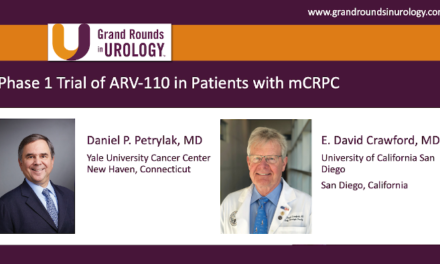
PCa Commentary | Volume 163 – March 2022
Posted by Edward Weber | March 2022
DECIPHER GENOMIC CLASSIFIER: Its Risk Predictions Assist in Decision-Making.
Heterogeneity is the Achilles’ heel of prostate cancer staging. Intermediate-risk cancers with Gleason Score 3+4 and 4+3 (i.e., Grade Groups 2 and 3) are especially fraught with this complexity. A report, “Molecular Analysis of Low-Grade Prostate Cancer Using Genomic Classifier of Metastatic Potential” (Klein et al. J Urol. 2017), determined Decipher scores from 269 prostatectomy specimens and found that although 80% had low Decipher scores (< 0.45), 13% harbored intermediate scores (0.45 – 0.6) and 7% high scores ( > 0.6). This finding suggests hidden aggressive behavior and poorer predicted outcome in a substantial number of canonical low-risk cancers. This Commentary will discuss the clinical usefulness of the Decipher Genomic Classifier in addressing this inherent heterogeneity.
What is Decipher?
Decipher is a commercially available panel of 22 RNA biomarkers that control cellular proliferation, cancer cell invasiveness, androgen receptor activity, immune modulation, and tumor suppression. The assay is performed on tissue. It is reported on a continuous scale, low-risk to high-risk, of 0 – 1.0. The Decipher assay provides a percentage probability of the risk of metastases within 5 years and the risk of prostate cancer-specific mortality within 10 years. The sensitivity of the Decipher assay lies in its capacity to identify molecular variations resulting from tumor heterogeneity, distinctions not captured in standard D’Amico categories of low-, intermediate- and high-risk. The assay cost is between $3000 and $5000, but it is approved and covered by Medicare.
Example: A man with a Decipher score of 0.36 has an estimated 2.5% risk of metastases in 5 years and a 3.1% likelihood of dying from prostate cancer within 10 years. This data provides context in which to make an informed management decision.
The 22 genes were selected from GenomeDx’s Decipher Genomics Resource Information Database, GRID, the largest collection of tumor RNA expression transcripts for urologic cancers. GRID is being constantly expanded for the purpose of fine-tuning the Decipher assay (and other tools) to identify clinically applicable biomarkers.
Decipher can assess the benefit of the addition of androgen deprivation therapy (ADT) after salvage radiation in men whose PSA progressed following radical prostatectomy:
This question was addressed originally by the Radiation Therapy Oncology Group (RTOG) in trial 9601 conducted between 1998 through 2003 (Shipley et al. NEJM. 2017). The study randomized 352 men with rising PSA after both surgery and salvage (delayed) radiation to receive either hormone suppression with the antiandrogen bicalutamide (150 mg daily for 2 years) or no drug. The purpose was to evaluate the overall survival benefit of ADT at 12 years follow-up.
Decipher used the archived prostatectomy specimens from this trial and tested them to see if Decipher risk scores could better predict the survival benefit of adding androgen deprivation.
Findings: The benefit of add-on hormone therapy after radiation differed substantially according to Decipher risk groups. For men receiving ADT with low Decipher scores (≤ 0.45), the absolute benefit for 12-year distant metastases, 12-year prostate cancer-specific mortality, and overall survival was 5.6%, 4.5%, and 2.4%, respectively. However, for the men with intermediate Decipher scores (0.45 – < 0.6) and high scores (≥ 0.6), the corresponding values were 15.7%, 11.5%, and 8.9%. The data showed that men with low Decipher scores experienced a relatively smaller benefit compared to those with higher scores. These data can inform a patient/oncologist discussion of whether ADT provides sufficient benefit to outweigh the adverse effects of long-term ADT. (ASCO GU 2020, Felix Feng, MD)
Two additional Decipher applications:
1. Decipher can predict the likelihood of metastases in 5 years in men whose PSA remain detectable at ≥ 0.1 ng/mL post-prostatectomy. Based on a study of 477 men, “Among detectable PSA patients, the 5-yr metastases-free rate was 0.09% for genomic low- and intermediate-risk scores and 18% for genomic high risk (p < 0.001). (Spratt et al. Eur Urol. 2018)
2. Three studies applied Decipher to aid in selection of candidates for active surveillance:
a. Among 241 men electing active surveillance, “Men with high-risk scores spent significantly less time on AS than men with Decipher low- and intermediate-risk scores (13.6 months vs. 33 months).” After transitioning to active treatment, “those with a Decipher high-risk score had a significantly shorter TTF [time to treatment failure] as compared to those with lower scores (p=0.007).” (Vince et al. Prostate Cancer and Prostatic Diseases. 2021)
b. Men with a Gleason 3+4 (favorable intermediate-risk) cancer considering active surveillance whose Decipher scores are low (< 0.45) have a 10-13% likelihood of having disqualifying adverse pathologic features compared to 41% for men in the high-risk group, suggesting that these low-risk men might be candidates for active surveillance. (Herlemann et al. Prostate Cancer and Prostatic Diseases. 2019)
c. A study by Kim et al. (Prostate Cancer and Prostatic Diseases. 2018), found that men considering AS whose Decipher scores were < 0.45 and < 0.2 were 91% and 96% likely, respectively, to lack adverse prostatectomy pathology, such as high tumor stage ≥ pT3, Gleason Score 4+3, or lymph node metastases, and were likely to be suitable candidates for AS.
BOTTOM LINE:
The Decipher Genomic Classifier identifies the molecular heterogeneity of prostate cancer and predicts the risk of metastases and future cancer-related mortality more accurately than existing standard clinical criteria. Decipher can be particularly useful in addressing problematic management decisions.
Your comments and requests for information on a specific topic are welcome e-mail ecweber@nwlink.com.
Please also visit https://prostatecancerfree.org/prostate-cancer-news for a selection of past issues of the PCa Commentary covering a variety of topics.
“I want to thank Dawn Scott, Staffperson, Tumor Institute Radiation Oncology Group, and Mike Scully, Librarian, Swedish Medical Center for their unfailing, timely, and resourceful support of the Commentary project. Without their help this Commentary would not be possible.”
ABOUT THE AUTHOR
Edward Weber, MD, is a retired medical oncologist living in Seattle, Washington. He was born and raised in a suburb of Reading, Pennsylvania. After graduating from Princeton University in 1956 with a BA in History, Dr. Weber attended medical school at the University of Pennsylvania. His internship training took place at the University of Vermont in Burlington.
A tour of service as a Naval Flight Surgeon positioned him on Whidbey Island, Washington, and this introduction to the Pacific Northwest ultimately proved irresistible. Following naval service, he received postgraduate training in internal medicine in Philadelphia at the Pennsylvania Hospital and then pursued a fellowship in hematology and oncology at the University of Washington.
His career in medical oncology was at the Tumor Institute of the Swedish Hospital in Seattle where his practice focused largely on the treatment of patients experiencing lung, breast, colon, and genitourinary cancer and malignant lymphoma.
Toward the end of his career, he developed a particular concentration on the treatment of prostate cancer. Since retirement in 2002, he has authored the PCa Commentary, published by the Prostate Cancer Treatment Research Foundation, an analysis of new developments in the prostate cancer field with essays discussing and evaluating treatment management options in this disease. He is a regular speaker at various prostate cancer support groups around Seattle.




